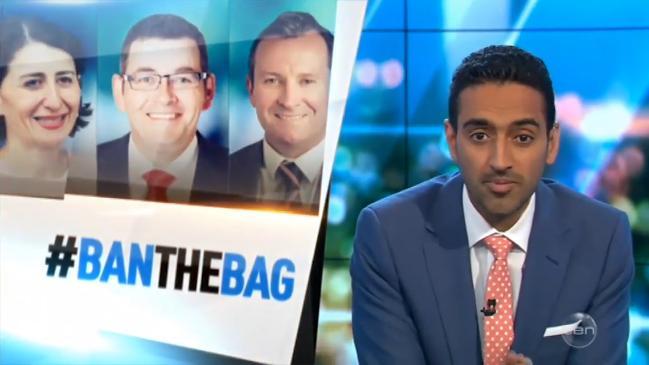Plastic bag ban: ‘You don’t actually need a plastic bin liner to put your rubbish out’
NOW that Coles and Woolies have scrapped plastic bags, what are we supposed to use in our bins for rubbish? Certainly not bin liners.

NOW that Coles and Woolies have scrapped plastic bags, what are we supposed to use to line our bins? Certainly not bin liners.
News that Australia’s two largest supermarkets were completely phasing out single-use plastic bags was met with praise from environmental groups on Friday.
The move will affect shoppers in NSW, Victoria and WA, bringing them into line with South Australia, Tasmania and the ACT, which already have statewide bans on plastic bags. A statewide ban in Queensland comes into effect next year.
From next year, shoppers will have to pay 15 cents each for heavier, reusable plastic bags.
Jon Dee, managing director of environmental lobby group Do Something and founder of the National Plastic Bag Campaign, called on the federal government to institute a nationwide ban. “Such a national ban would reduce Australia’s plastic bag use by at an estimated six billion bags a year,” he said.
Woolworths chief executive Brad Banducci said the supermarket handed out more than 3.2 billion plastic bags a year and “hence can play a significant role in reducing overall plastic bag usage”.
“Today’s commitment shows we are committed to taking our environmental and community responsibilities seriously,” he said.
The problem with scrapping plastic bags, however, is it increases use of bin liners.
In 2012, a review of South Australia’s bag ban found just 15 per cent of consumers purchased bin liners before the ban, compared with 80 per cent after, “increasing some scepticism about the broader environmental benefit”.
The review suggested that “any future initiatives should include a focus on changing household bin liner behaviour”. That’s because bin liners “do not break down well in modern, highly compacted landfills”, a 2014 WA government study noted.
In 2011, a report by the UK Environment Agency found single-use plastic bags actually had the lowest overall environmental impact in eight out of nine categories compared with heavier options, when the entire production and transport life cycle was taken into account.
A paper bag would have to be reused seven times to have the same “global warming potential” as a traditional plastic bag used as a bin liner, a heavy-duty plastic bag nine times, a tote bag 26 times and a cotton bag 327 times.
That study calculated that just over four in 10 of all lightweight plastic bags were reused in the place of heavier bin liners.
With 90 per cent of households using either bin liners or plastic bags to line their bins, plastic bags being phased out and bin liners discouraged, the natural question becomes — what exactly are you meant to use?
Well, ideally you shouldn’t put anything in your bin except rubbish.
The “practical solutions” to the bin problem floated in the 2014 study include “reusing or composting leftover food”, “wrapping food scraps in sheets of newspaper prior to disposal (if this is done properly, the waste will not ‘sweat’ and begin to smell as it does in plastic bags)”, “lining bins with several layers of newspaper” and “freezing food scraps prior to the scheduled collection day”.
“I haven’t used a plastic bin liner in 25 years,” said Mr Dee. “The simple fact is you don’t actually need to have a plastic bin liner in order to put your rubbish out. Every four to six weeks rinse out the bin and empty it on the grass.
“The first thing you should do is look at what shouldn’t be in your bin. Any food or compostable items should go in the compost, and recyclables should go in the recycling. If you do that you find the bin smell is significantly reduced.”
For people living in apartments, many councils now run composting schemes for food scraps. To find out if your apartment has a food waste recycling bin, go to RecyclingNearYou.com.au and type in your postcode.
Mr Dee said if compost wasn’t available, the other option was the newspaper trick. “There are a lot of free community newspapers,” he said. “Once you finish reading, spread them out flat on your kitchen bench top, put any food waste in and wrap it up like your grandmother used to, roll it up like fish and chips.”




